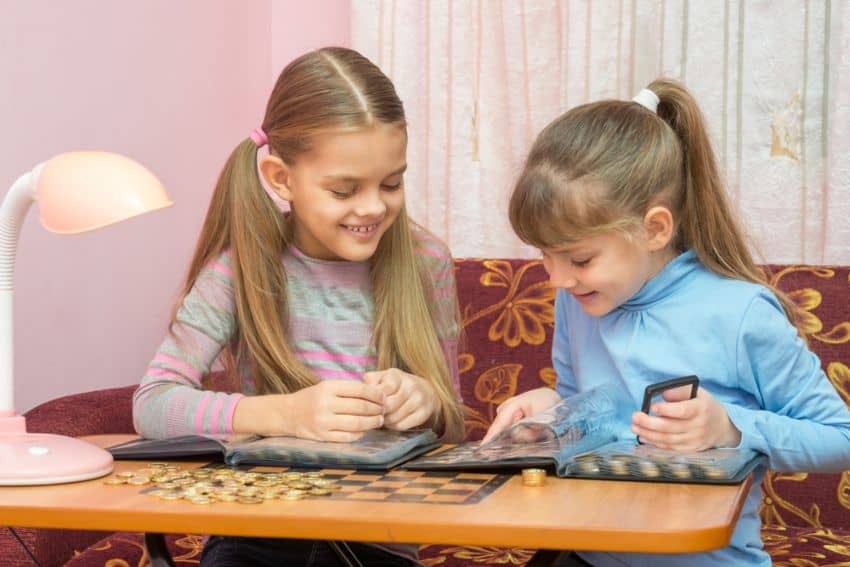
Are you a parent or a kid wondering if coin collecting could be a good hobby for the under 18-year-old crowd?
I understand that this hobby is often associated with older generations, yet there are actually many youngsters who enjoy this activity.
This article will walk you through all the details you need to learn about coin collecting for kids!
Is coin collecting a good hobby for kids?
In a word: absolutely!
We are talking about a lifelong hobby, and many who enjoy it into their elder years started collecting as kids. In fact, coin collecting has many potential benefits for kids, such as:
1. Learning about history
There is a ton of history wrapped up in those little metal circles. As kids grow their collection, they’ll want to know all about each coin…
…They’ll learn about presidents, states, symbols, and historical events.
2. Understanding caring for belongings
In today’s throwaway culture, learning to care for one’s belongings so they will last years into the future is a great skill.
Kids will have a greater appreciation for how to treat their possessions when they learn that caring for their coins properly can maintain their condition and value.
3. Learning organization
Coin collections require organization, which can bleed into other aspects of children’s lives.
They can gain a sense of satisfaction from putting their coins in order. An understanding that one’s belongings should each have a proper place can have long-lasting benefit.
To learn more about that, check this guide on how to organize coins!
4. Making friends
One of the best aspects of this activity for collectors of all ages is the community it creates!
You’ll meet all kinds of friendly folks who share similar interests. Numismatists, young and old, are eager to help each other learn about the hobby.
5. Learning about human culture
Especially if you collect ancient or world coins, you can learn all about different societies.
Currency touches so many aspects of our human culture so coin collecting can really expand your worldview.
6. Interacting with people of all ages
This activity can be a great way for older family and friends to bond with the younger generation. It is incredibly heartwarming to watch these relationships blossom through a common hobby.
7. Understanding economics
Kids will learn why coins have value, how they are assigned their worth, and how this can fluctuate over time.
In the process, they’re learning principles of economics, often without even knowing it! They’ll also learn about spending their own money and saving up over time to purchase coins for their collection.
8. Practicing attention to detail
Inspecting and grading coins involves looking for the most minute details. This is an important skill for kids to learn for schoolwork and many other aspects of life.
9. Learning about science
What types of metal make up coins? Why do coins look different over time, and what can damage them?
These questions and more, which kids will learn about will expand their scientific knowledge and curiosity.
10. Not limited by seasons or weather
Sure, sports and outdoor hobbies offer many great benefits for kids, but they are often limited by seasons and the weather.
Numismatist is a year-round activity that can fill in the gaps or serve as a constant in a youngster’s life. It also doesn’t have to take up so much time that other hobbies cannot be enjoyed as well.
11. Earning a scholarship
The American Numismatic Association awards two $1000 scholarships to young numismatists each year. In addition, collecting coins can be listed as a hobby on college applications and used in projects for school or scouting programs.
12. Learning about geography
Kids will learn about U.S. states, capitals, mint locations, and even more if they expand into world coins.
They can organize their coins by location or even find folders that place them on a map.
What age can kids get started?
Kids from school age on up can enjoy this hobby! Generally from the age of 5 and higher, kids will have the reading skills, attention span, and fine motor skills needed to successfully participate and gain enjoyment from checking coins.
Ask an older numismatist when they got started, and you’re sure to hear many stories about when they got their first coin, often as a child or teen.
Essentially, once kids know not to put money in their mouth, they’re ready to go! It’s often the young ones who will be most mesmerized by the tiny treasures, and they might just be hooked for life.
How can kids get started with coin collecting properly?
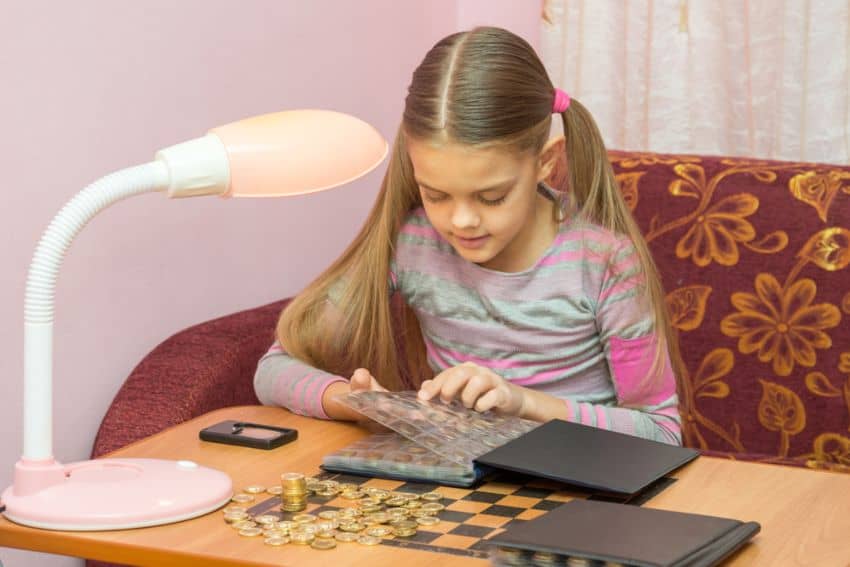
There are plenty of ways to gain an easy start into the hobby, and we’ll review several tips here. The great thing is, it doesn’t take a lot of money or special tools to get started.
1. Learn from an older collector
A great way for kids to learn about this activity is from a friend or family member who is a collector themselves.
While you can find much information online and in books, it can be easier for young kids to be shown tips and hear them directly from someone they trust. Plus, it’s often more fun that way!
Other collectors love to show off their collections, and this can help inspire younger practitioners as well as teach them how to care for, organize, and build their own collections.
2. Attend coin collecting events
There’s a sense of excitement that comes from attending a coin show!
It can expand your horizons greatly in the span of a few hours, even if you aren’t actively buying. Give one a try and see how much you can absorb.
Attending events hosted by a local nearby club can also be a great way to meet other numismatists and learn about the hobby. Depending on your area, there may even be events specifically for young collectors.
Your kids could even start his own coin collecting club at school to learn along with friends at his age.
3. Use folders or albums
Coin folders and albums (Check this Album Here at Amazon) are a great way for kids to get started. The type I’m referring to have insets that are labeled for specific coins.
The cardboard cover gives the coins some protection, and the inside provides a roadmap to complete a set for a specific type of coin or a variety around a theme.
Kids will get a thrill from finding each coin to fill a hole in their book. They can store them safely on a shelf and easily check the progress of their collection.
For more, have a look at these Coin Albums!
4. Join the American Numismatic Association
As the largest coin collecting organization, becoming a member will provide kids with many benefits.
Their young numismatist program is designed for kids age 5 to 17 years old and has affordable dues. Joining will give kids the following:
- Subscription to the organization’s monthly magazine (and access to its archives)
- Ways to earn free coins
- Access to games, quizzes, other activities, and a blog
- Ability to participate in a practice coin auction just for young numismatists
- A birthday surprise
- Ability to attend “coin camp” for teens
5. Self-study
There are many books and websites for kids to learn about the hobby (Check these Coin Books).
I’ll review some of the best ones later in this article. A great thing about this activity is you can get started with a little bit of knowledge and continue learning over time.
Even those who have been collecting for decades are still learning. Just because you don’t know everything, this doesn’t mean you can’t participate and enjoy the hobby.
What are the best coins to get started?
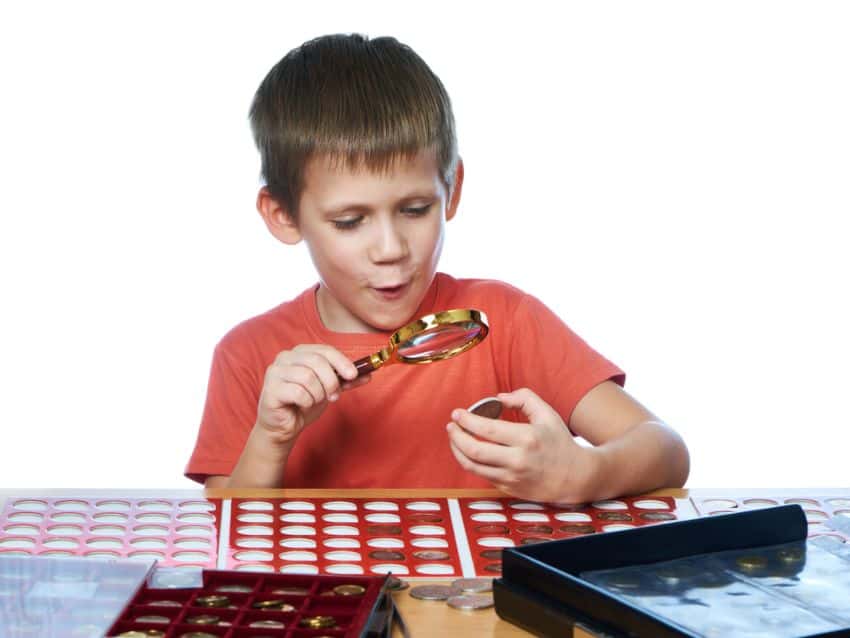
Coins from everyday circulation are the easiest for kids to get started with…
…You won’t have to worry about a child ruining the value of a coin, and they’ll still be amazed by the wonder of learning about coins that are floating around out there every day.
Plus, they can even afford to spend their own money to start their collection.
1. State quarters
Getting a folder for state quarters (Check this Folder Here at Amazon) and having the child fill it in over time is an easy and fun way to start out!
There are even folders that look like a map to add to the adventure. The hunt will have them looking through pocket change every place they can find.
2. Jefferson nickels
Jefferson nickels are a great choice for getting started, because of their high availability and low cost. You can get a folder for Jefferson nickels (Check it Here at Amazon) and purchase two rolls of circulating coins, all for less than 10 bucks.
Because these nickels are so hardy, you can often find ones in circulation that are 50 to 60 years old.
These will give great practice for identifying mint marks and starting to look at quality (pick the best you can find from a particular year).
3. Coins from the child’s birth year
While uncirculated U.S. mint sets for a particular year typically make poor investments, they can be fun for a child to have just to see what mint condition looks like and have something so pristine in their collection.
You can also have them accumulate their own set of circulated coins from their birth year. It will be a collection specific to them.
4. Whatever interests the child (within reason)
The same rule applies for collectors of any age: you should collect whatever interests you the most.
For kids, there will obviously need to be some limits for cost and ability, but the point is to let the child have some input into what coins they are collecting.
It might be coins with animals on them, Lincoln pennies for their favorite president, or something else entirely.
They’ll be doing some of their own research so let them have a say in the direction of their collection—it will be much more fun that way.
What skills should kids learn for coin collecting?
There are a few basic skills that will help kids starting out:
1. Identifying coins
At the most basic level, kids should learn the different identifying features of coins. Have them practice finding the mint mark, year, inscription, and identifying different types of edges.
Older children can benefit from starting to learn about coin grading.
2. Proper coin handling
How to handle a coin the right way is another important skill for young collectors. Teach them to always hold a coin by its edges and to wear cotton gloves when handling valuable coins.
As part of this lesson, kids should also learn what factors affect a coin’s value. This will help explain why coins should be handled a particular way.
3. Who to trust and how to spot a fake
Young collectors will do well to learn early how to find a trusted dealer and how to spot signs that a coin is too good to be true. Skepticism can go a long way in life and in coin collecting.
Learning about myths of the hobby can be fun, and kids will enjoy spreading the knowledge by telling their friends.
4. How to look up coin information
While so many kids are used to consulting online sources today, learning how to use a reference book for coins is a handy skill.
It can often be quicker and more reliable to consult a coin book so young collectors should get practice with them.
5. How to manage money
It will be helpful for young kids to have a basic knowledge that currency is worth something and what that means.
Helping kids with the math of money can get them started on the right foot in coin collecting and will benefit them when they want to save and spend their own money.
What tools do kids need to collect coins properly?
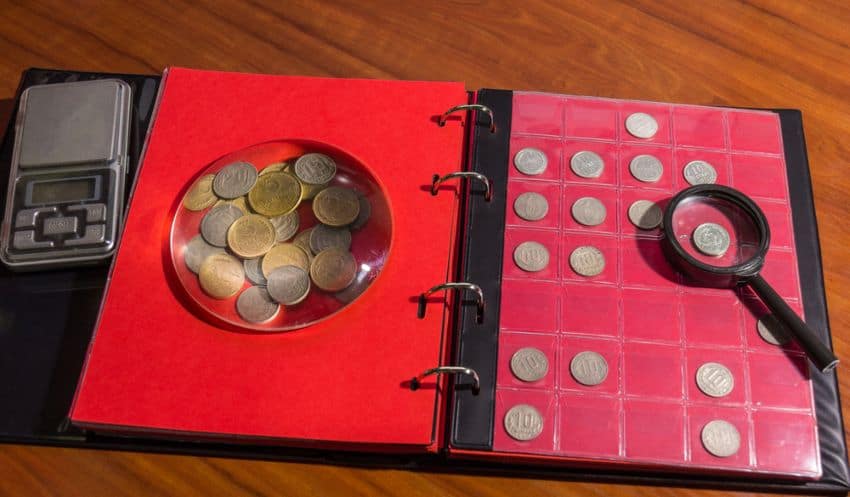
Just a few basic supplies will get kids started in the hobby, and you can always add more tools as you advance. To start, I’d recommend having the following on hand:
1. Handheld magnifier
A magnifying glass or other type of handheld magnifier that magnifies 5x to 10x will be sufficient for inspecting coins up close.
You can check these good coin magnifiers.
2. Ruler in millimeters
A clear flexible ruler works great for coins, and they are also incredibly affordable. It will be good practice for kids to start measuring the diameter and thickness of their coins.
3. Coin notebook
A simple lined notebook will do fine for a child’s coin notebook. Have them get in the habit of keeping a list of coins in their collection, along with coins they are missing and would like to add.
They can also make note of special coin facts they want to remember.
4. Storage tools
We’ve discussed albums and folders already, which are ideal for kids to get started. Even for beginners, make sure to purchase archival quality storage materials.
Cardboard 2×2 coin holders stored in a box or album sheets also work well.
To learn more about this topic, check this guide on storing coins properly!
5. Cotton gloves
Though optional for handling circulating coins, a pair of cotton gloves will help kids get into the practice of properly handling their coins.
They’ll also make the child feel like a true collector.
6. Coin book
Choose a book designed for beginners or for children to help the new collector learn more about coins and get started with identification (and even grading).
What educational resources are good for kids?

There are plenty of resources available to help kids get started in the hobby. Check these out for starters:
1. Websites
U.S. Mint H.I.P. Pocket Change Website
Games and activities, coloring book, videos, and information on coins and collecting specifically geared towards kids.
ANA’s Young Numismatist Website
Find coin resources, games, activities, and videos for coin collectors age 5 to 17.
2. Coin collecting books for kids
I’ve reviewed some coin collecting books for beginners and kids in a separate post (Check it Here).
Some provide information about the hobby as well as spots for kids to start their own collection. Some of my favorites are:
- A Kid’s Guide to Collecting Coins by Arlyn G. Siebe
- Coin Collecting for Kids by Steve Otfinoski
- Lots and Lots of Coins by Margarette S. Reid
- Curious About Money by Mary E. Reid
- National Geographic Kids Everything Money by Kathy Furgang
- One Cent, Two Cents, Old Cent, New Cent by Bonnie Worth
3. YouTube
YouTube is how kids learn everything these days. Some popular coin collecting YouTube channels with good information for beginners include:
- Couch Collectibles
- Treasure Town
- American Numismatic Association
What related hobbies might kids find enjoyable?
Coin collecting may get kids interested in related hobbies. Some other hobbies that don’t require a lot of special equipment or physical skill include:
1. Collecting gems and minerals
For collectors who are science enthusiasts, gems and minerals can be an exciting expansion hobby.
Collecting gems and minerals relies on many similar skills as coin collecting, such as identification, organization, and a continual quest for knowledge.
2. Metal detecting
The only specialized equipment required is the metal detector. Smaller children may need an adult to help, but perhaps they can wield the spade.
Metal detecting and coin collecting are closely related. They both feed a person’s thrill for the hunt.
For those concerned that coin collecting is only an indoor hobby, metal detecting can be a nice addition.
How can parents support their kids to collect more coins?
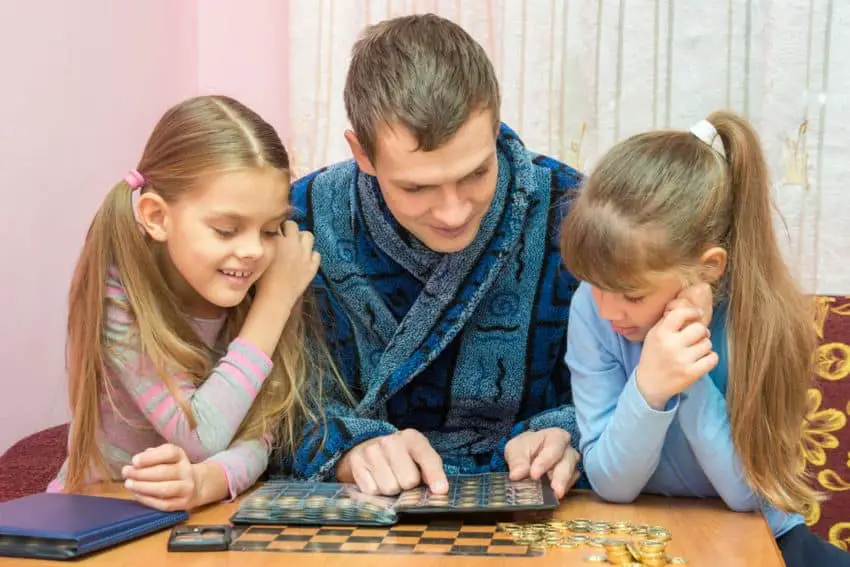
Thankfully there are no weekly practices or lessons to drive to and from should your child take up this activity, but there are ways you can support your child in making the most of it.
1. Take them to events and shops
From coin club meetings to coin shows, young numismatists will greatly benefit from seeing other collectors and collections up close and in person.
These in-person interactions can not only make the hobby more enjoyable, but also go a long way in boosting kids’ coin collecting knowledge.
It can also be helpful to assist your child in finding a trusted local coin dealer that they can purchase from.
Visit them together and give the dealer a parental seal of approval before your child spends a dime there.
2. Provide assistance and supplies
Though you don’t need to be an expert numismatists, or even a collector at all, your child may need some help with certain tasks…
…They will certainly need help making sure they spend their money wisely and select adequate supplies.
You can consult some of the same resources listed in this post to become knowledgeable enough to provide a helping hand. You don’t have to take up the hobby yourself, though you might just be tempted.
It can be helpful to set a budget each year so you know what the investment will be upfront and can keep it at a reasonable level.
3. Remember their hobby at gift-giving Occasions!
Supplies, coin collecting books, and even coins to add to their collection can all make great gifts for a child who is getting started!
Remember this and tell their family members for occasions such as birthday…
4. Visit a U.S. mint together
If you live near a U.S. mint or can fit it into a family vacation, this can be a memorable and educational activity to do together with your young collector.
You might just get as much enjoyment out of the visit as your child.
5. Be supportive!!
Overall, even if coin collecting is not your activity of choice, parents should be supportive by being interested in the things their child is learning and passionate about.
Let your child tell you about the histories of their coins and show you their coins’ special features.
Help him/her look for more information if they have questions they want to get answered. Nurture their curiosity!
Final Thoughts
In summary, numismatics could be an enjoyable hobby for kids age 5 and up … They will practice skills that can benefit them in other areas of life!
Collectors are always learning, and this learning takes place over a lifetime …
… There are many educational resources available to help kids get started, and supportive parents are also key to creating the next generation of coin collectors.
With a little bit of basic skills, tools, and knowledge, kids can take part in a rewarding hobby that gives them pleasure for decades to come.
I also have this coin collection beginner friendly in-depth article that cover the nitty gritty of the hobby! Totally recommend it!
